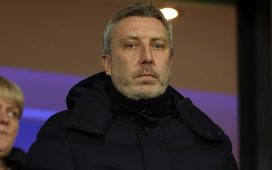LEICESTER, England — Even now, Liverpool’s fans will not sing that song. Not after Jürgen Klopp’s team swept aside Leicester City, currently its closest rival in the Premier League title race. Not after a 4-0 win, and not after the most imperious performance it has produced this season, which is no light compliment given that Liverpool has won 17 of its 18 games so far, and tied the other.
They will not sing it with the cushion of a 13-point lead over Leicester, and not with a 14-point advantage over the team Liverpool is hoping to depose — and the one team that, realistically, still poses a threat — Manchester City.
The fans will toy with it, play with it, allude to it, as if in doing so they are indulging a little frisson of danger. They will take the melody and apply it other subjects: declaring their team the champion of the world; singing the praises of Trent Alexander-Arnold, their local hero; or expressing their dislike of Boris Johnson, the British prime minister, a man who has long had an uneasy relationship with the city of Liverpool.
But the words are off-limits, taboo, proscribed by some unwritten covenant. No matter how well their team plays or how many games it wins or how large its lead in the standings grows, Liverpool’s fans will not do it. They will not sing the line: “We’re going to win the league.”
There is a reason. Liverpool’s fans know more than most about tempting fate. They sang the line in 2009, after a last-minute, pulse-quickening win against Fulham in the spring, only to see Manchester United slip into another gear and roar past in the last few weeks of the season.
They sang it in 2014, when Luis Suárez, Daniel Sturridge and Raheem Sterling hit that patch so purple it went ultraviolet, when the goals and the wins came so easily, only for it all to disappear in one moment, in one slip, in the Anfield sunshine.
And they sang it last year, too, when Klopp had crafted a team good enough to win the Champions League, a team good enough to lose only one game across a whole Premier League season, only for Manchester City to muster an even better run of form, going through the final four months of the season entirely unblemished and beating Liverpool at the post.
It is 30 years, now, since Liverpool did win the league, and that long, painful wait has bred a desperation, a trigger-happiness, a willingness to believe. And yet Liverpool’s fans, it seems, are determined not to be fooled again.
That attitude is reflected in Liverpool’s manager. Klopp took a minute, after this game, to run through his team’s forthcoming fixtures: Wolves, the Premier League’s surprise package; Sheffield United; Everton (albeit in the F.A. Cup); Tottenham Hotspur; Manchester United. He puffed out his cheeks. “It doesn’t sound like anything is decided to my ears,” he said. “This was just a game. It didn’t decide anything.”
He will see all of the pitfalls that lie in wait, of course. He will know that he has already lost two central defenders to injury, and that the absence of another one would leave his team exposed. He will know that Liverpool will be without Fabinho, the cornerstone of its midfield, for the most challenging run of matches of its season, and that Alex Oxlade-Chamberlain is out for the next six weeks, too.
Klopp named a squad here on Thursday with five “adult” players on the bench — his word — and two kids. Liverpool has spent far too much money building this squad in recent years to plead poverty, but still, he might feel that his resources are a little thinner than is ideal.
That will be his greatest fear: the effect of cumulative fatigue. Just because Liverpool has managed to endure its run of 11 games in 33 days so far does not mean all that workload will not tell — either in a dearth of form or a dearth of players — at some point in the next two weeks or, perhaps, even later than that. He will know that Manchester City will be lying in wait, ready to seize on any stumble.
Enjoying the ride, not getting too far ahead of himself, comes easily to Klopp, a self-confessed optimist in every situation except the one in which he is about to manage a team in a soccer match. It comes less easily to his team’s fans, of course, so disappointed so often in the last 30 years, so keen for the wait to end, so full of hope that it might soon be over.
For now, though — whatever temptations lie in their path — that is what they are trying to do. To enjoy a team that has not lost in the Premier League since its first game of 2019, a run of 34 games, a team that has not lost at home for more than two years, that has dropped points only once since March. To appreciate a side that presses and harries with ravenous hunger, that delivers rapid-fire, ruthless counterpunches, that can beat an opponent in the air and on the ground, that never knows when it is beaten, that seems to relish snatching victory at the death.
There is no point, yet, wondering where it all might lead, worrying that it might all come crashing down at any moment. Liverpool knows all too well exactly what might go wrong. For all his protestations that the “number” of points in its lead is irrelevant, so does Klopp. “No team with a lead this big has ever lost the title,” he said. “But that sounds negative to me, so why would we think about it?”
That, in truth, is the biggest test that Liverpool must pass: coping with the anxiety that will set in as the dream of a generation drifts closer to reality. That is what Klopp knows, what his fans know, what they must overcome before they can break the taboo, before they can sing that line, before they can genuinely start to believe that they are going to win the league.








